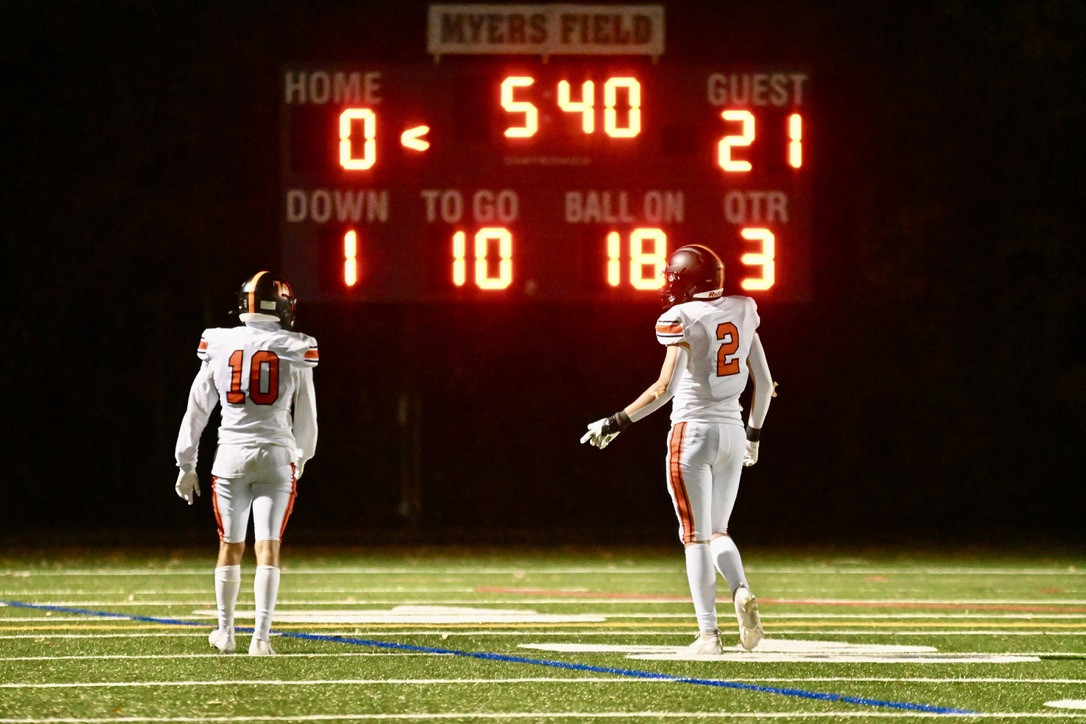 Yesterday, Dave Ryan’s essay entitled “Legislative Inequalities: How the United States Taints Freedom” was chosen as the winner of the 2009 Freedom Prize.
Yesterday, Dave Ryan’s essay entitled “Legislative Inequalities: How the United States Taints Freedom” was chosen as the winner of the 2009 Freedom Prize.
Every year, the Freedom Prize is given by the Wayland Veterans for the entry that is judged to be the best on the topic of freedom. Most submissions are essays, but they can also be in other forms like performances or graphic arts. Last year, the winner was Erica Van Sciver, for her essay called “The Torture Word.” Ryan’s article is about anti-gay legislation written into law in the United States.
Ryan said, “I wrote on this topic because it is one of the bigger civil rights battles of our time, yet it is an easy issue to fix. There really shouldn’t be much to debate about, as it is a question of equal rights for everyone in the U.S.”
This is a hot topic right now, with gay marriage starting in September in our neighboring states of Vermont and Maine. Everyone seems to have an opinion on this topic, including Miss California. When asked what made his essay stand out from the rest, Ryan said, “I think I was able to convey that I believe strongly in my topic.”
Here is Dave Ryan’s winning essay.
Legislated Inequalities: How the United States Taints Freedom
by David Ryan
“I have a dream that one day this nation will rise up and live out the true meaning of its creed: – ‘We hold these truths to be self-evident, that all men are created equal.’” – Rev. Martin Luther King, Jr. August 28th 1963
In the United States, we live with the universal belief that our government exists to protect our freedom. Growing up we are taught that we have the undeniable right to freedom of speech, freedom of religion, and the freedom of expression. We are taught that no one can take these rights away — these rights are the core of American ideals. Freedom is the foundation of the American Dream: the idea that everyone should lead a comfortable life, pursue their ambitions, and stand up for what they believe in — all without persecution. The Declaration of Independence defines the American Dream as the unalienable right to “Life, Liberty, and the pursuit of Happiness.” There is a common misconception that the American Dream is within the grasp of anyone with enough determination. Even though gay, lesbian, bisexual, and transgendered Americans are legal American citizens, they are not given the equal protections, liberties, and opportunities that are the birthright of every American. Under the eyes of the U.S government, there is a second-class of citizens in this country: a lower, less deserving class.
Laws on both national and state levels restricting the rights and liberties of gay, lesbian, bisexual, and transgendered persons violate American citizen’s basic constitutional rights. Anti-gay legislation has significant economic and social ramifications for millions of Americans. The Defense of Marriage Act (Public Law 104-199), “Don’t ask, don’t tell” (Public Law 103-160), and too many other anti-gay policies are in direct violation of the rights and freedoms guaranteed to all citizens under the United States Constitution.
The Defense of Marriage Act (or DOMA), passed in 1996, forbids the federal government and its agencies from recognizing same-sex marriages, even when these marriage licenses have been issued by one of the 50 states. This law lets each individual state decide whether to allow same-sex marriages or civil unions, and whether to recognize same-sex marriages and unions issued by other states. Not only does the law dehumanize same-sex couples, but it also prohibits them from enjoying the 1,138 benefits, rights, and privileges that come with a nationally-recognized marriage.1
The 14th Amendment to the Constitution states: “No State shall make or enforce any law which shall abridge the privileges or immunities of citizens of the United States; nor shall any State deprive any person of life, liberty, or property, without due process of law; nor deny to any person within its jurisdiction the equal protection of the laws.” However, DOMA denies gay couples significant joint tax benefits, hospital visitation rights, medical decisions for partners, domestic violence protection, and many other crucial rights given to married couples. Forty-one states ban same-sex marriages through constitutional amendments or statutes, and four other states limit and restrict how and where gay couples can formalize their relationship.2 Even gay married couples from Massachusetts, Connecticut, Iowa, and Vermont — the only states that currently allow unrestricted same-sex marriages — do not receive the 1,138 benefits of a nationally-recognized marriage.3
Utah, Oklahoma, Arkansas, Alabama, and Michigan have taken gay marriage legislation a step further, making it illegal for gay couples to adopt children in those states, even when one partner is the birth parent. By denying gay couples marriage certificates, the U.S. government has sent a message to the world that we embrace discrimination in this country, and, worse, that we would rather have children living in group foster care than in a home with loving parents.
One woman, identifying herself as Jackie from Maine says,
I was not allowed at my partner’s funeral and had no rights…. We were together 3 years and would have been married if the law allowed. When she passed away I had no rights to anything; I was not even allowed at her funeral. Her family took her body back to Ohio from Maine where we lived together most of our relationship –even though her wish was to be buried in Maine. They also wouldn’t allow me to send her favorite outfit to put her in. They bought an outfit she never would have even worn. They took a picture of us and tore it in half and gave her half to the mortician and my half to the funeral director to keep me out of the funeral. Thankfully her Aunt knew the truth and was there for me and kept her cell phone on so I could hear the funeral over the phone. Hearing the service over the phone and visiting her gravesite after everyone had left was the only closure I had.4
Jackie’s experience is one of many heart-breaking stories that show the effects of DOMA. Her story is a prime example of how our government has limited the freedom of GLBT citizens. Worse, Jackie’s partner’s wishes weren’t respected when she died. Matters of the heart are out of the jurisdiction of the government. DOMA has wrecked countless lives and relationships such as Jackie’s. The United States government has tainted freedom for millions of Americans, but they didn’t stop with marriage.
The United States Armed Forces make up the most advanced military force on the planet. “Don’t ask, don’t tell” is legislation that prohibits military personnel from being open about any form of homosexuality while in the Armed Forces. The legislation states that having gay soldiers “would create an unacceptable risk to the high standards of morale, good order and discipline, and unit cohesion that are the essence of military capability.” Under the policy, soldiers who do reveal their homosexuality will be immediately dishonorably discharged. Since the policy was enacted in 1993 the military has dishonorably discharged nearly 12,500 troops from the Armed Forces.5 Denying gay and lesbian service personnel the ability to be free and open about who they truly are is not only unconstitutional, it severely limits their freedom, and puts undue pressure on them when they’re on the battlefield. The “Don’t ask, don’t tell” policy not only denies gay service members the ability to be open about themselves, but it also insults them, considering them a liability because of their sexual preference. The policy was a reaction to a number of brutal murders in the Armed Forces in the early 1990’s.
One of the circumstances that led to the creation of the “Don’t ask, don’t tell” policy was the death of Allen R. Schindler, a U.S navy officer posted in Japan in 1992. Schindler was found brutally murdered in a public restroom near a U.S. military base in Sasebo, Japan. Allen Schindler had recently revealed to his shipmates and commanding officer that he was gay. Terry Helvey and his accomplice Charles Vins, shipmates of Schindler’s, stomped on him in the restroom until he was so disfigured that he was only identifiable by tattoos on his arm. His attackers destroyed every organ in his body, left four fatal injuries to his head, chest, and abdomen, broke all but two of his ribs, and cut his penis.6 This brutal hate crime was almost silenced by the Navy. According to Will Joyner, a journalist from The New York Times, “The Navy was less than forthcoming about details of the killing, both to the news media and to the victim’s family.” The original charges against Helvey would have had him put to death, but a court-sanctioned deal allowed him to plead guilty and spend the rest of his life in military prison. Helvey’s accomplice, Charles Vins, was allowed to plead guilty to three much lesser charges. He served only a 78-day sentence before receiving a general discharge from the Navy. The ship’s captain, who tried to keep the whole incident quiet, was only demoted and reassigned to work in Florida.
The “Don’t ask, don’t tell” policy doesn’t protect gay service personnel, it only protects the United States government. Soldiers being harassed about being gay, lesbian, bisexual, or transgendered can’t go to commanding officers to report the behavior without being dishonorably discharged. Even if the soldiers are heterosexual and being harassed by homophobic peers they can’t report it to a higher authority. The “Don’t ask, don’t tell” policy also doesn’t protect soldiers from hate crimes such as the one committed by Terry Helvey and Charles Vins. The policy only insults gay and lesbian service personnel who are willing to sacrifice their lives in order to protect our country. Every member of the Armed Forces deserves every American citizen’s unwavering respect and gratitude. Our government has no respect or gratitude for GLBT Armed Service members.
DOMA and “Don’t ask, don’t tell” reflect an alarming trend in U.S. policy. A policy created in 1983 by the Food and Drug Administration (the FDA) bans men from ever donating blood if they have had sex with another man since 1977. The policy was written in an attempt to prevent the spread of HIV through blood transfusions. While the FDA claims the policy isn’t discriminatory, the Red Cross and two other blood groups call the policy “medically and scientifically unwarranted.”7 According to the Center for Disease Control, gay men are the highest risk group for spreading HIV through transfusions, but African-Americans are the highest at-risk ethnicity.8 People between the ages of 30-40 are also more likely to transmit HIV through transfusions according to the Center for Disease Control’s data, but both African-American’s and people between the ages of 30-40 are allowed to regularly donate blood. The likelihood of getting HIV through a blood transfusion is one in 2 million, and screening procedures have advanced greatly since 1983. 9 The policy prevents many healthy gay men from donating potentially life saving blood, and it’s discriminatory because other high-risk groups are allowed to donate.
While DOMA may be an explicit example of the legislated inequality of the GLBT community, a more subtle – but no less damaging – inequality results from the complete lack of reference to the GLBT community in The Employment Non-Discrimination Act. This act is a national law protecting the rights of workers in the United States. It protects on the basis of race, gender, religion, national origin or disability, but there are no protections based on sexual orientation or gender identity. Twenty states have passed laws protecting GLBT rights in the workplace, but in the other 30 states there is no protection for gay workers. In 30 states in our country, it is completely legal to fire someone on the basis that they are gay, lesbian, bisexual, or transgendered. 10 The lack of gay worker protections can also result in unequal salaries for GLBT Americans when compared to heterosexuals, one of the most vital protections offered by the legislation.
DOMA has affected gay worker rights as well. If gay or lesbian police officers die in the line of service their partners and children won’t receive financial support like heterosexual police officers because they can’t be legally married to their partners. While there may be no legislation limiting gay workers’ rights, there is also nothing to protect them. The lack of protective legislation is discriminatory, because it leaves the legality subject to interpretation. There are millions of American workers who are gay, or who rely upon gay workers for financial support. By omitting equal protection under the law, the federal government is leaving the financial future of gay Americans and their children teetering in the balance.
When our founding fathers declared independence from Great Britain in 1776, it was to free themselves from the oppression of a government that treated them as second-class citizens. When the founders wrote the Constitution it was to establish a government that would serve as a foundation for a free society. Anticipating the evolution of our society’s definition of equality and justice, the founders included the ability to amend the Constitution, so as time progressed we would still be able to preserve freedom. When the national Bill of Rights was enacted, the protection, equality, and freedom of every citizen was at its core. Freedom has always been the American Dream, right from the very start. While the American Dream may be attainable by hard-working heterosexuals, it is not within the grasp of GLBT Americans. The harder GLBT Americans work towards that dream, the more disappointed they are when they realize that they aren’t as free as heterosexuals in this country. GLBT Americans see complete strangers pass judgment on their loving relationships, they see hate crimes go unchallenged, they see higher taxes and second-class treatment, and they see the freedom that heterosexuals have that’s out of their reach.
When even one citizen’s freedom is limited, it weakens the foundation of freedom for every other American. When a gay citizen’s rights are denied, not only are they affected, but their family, their children, and their friends feel the effects too. In his first inaugural address, Franklin D. Roosevelt told the country that “the only thing we have to fear is fear itself,” but there is more to it. We should instead fear ignorance, the destructive blend of fear and misinformation. Ignorance and intolerance are the greatest threat to freedom as we know it. In societies based on ignorance and intolerance, citizens can only be as free as the most oppressed minority. Opponents to gay rights don’t realize that through their ignorance they’re creating a society that will deny them freedom in the near future. Many opponents to gay rights insist that there’s a “gay agenda” to gain power, but ignorance and intolerance have blinded them. There is no “agenda” to ruin the sanctity of marriage, there is no “agenda” to take over the country, there is no “agenda” to convert heterosexuals, and there is no “agenda” to brainwash children with gay messages. The only “gay agenda” is the desire to live the American Dream, free from oppressive, unconstitutional legislation enacted by the United States of America.
Footnotes:
1. Danya K. Shah “Defense of Marriage Act: Update to Prior Report.” Letter to Senator Bill Frist, Senate Majority Leader. 23 Jan. 2004. GAO.gov. 23 Jan. 2004. United States General Accounting Office. 8 Mar. 2009 .
2. “Same Sex marriage, Civil Unions and Domestic Partnerships.” National Conference of State Legislatures. April 2009.
3. Danya K. Shah “Defense of Marriage Act: Update to Prior Report.” Letter to Senator Bill Frist, Senate Majority Leader. 23 Jan. 2004. GAO.gov. 23 Jan. 2004. United States General Accounting Office. 8 Mar. 2009 .
4. Jackie. “I Was Not Allowed at My Partners Funeral and Had No Rights,” Join the First Virtual March for LGBT Equality – Learn the 1138 Reasons Equality Matters. 08 Mar. 2009. .
5. Leo Shane III. “Obama wants to end don’t ask, don’t tell policy,” Stars and Stripes 16 Jan. 2009.
6. Chip Brown, “The Accidental Martyr,” Esquire Dec 1993.
7. Steven Kleinman, MD. “Behavior-Based Blood Donors Deferrals in the Era of Nucleic Acid Testing (NAT)” AABB 9 Mar. 2006.
8. “Basic Statistics,” Basic Statistics | Statistics and Surveillance | Topics | CDC HIV/AIDS, 2007, Centers for Disease Control and Prevention, 20 Mar. 2009.
9. “Basic Statistics,” Basic Statistics | Statistics and Surveillance | Topics | CDC HIV/AIDS, 2007, Centers for Disease Control and Prevention, 20 Mar. 2009.
10. “Your Rights Against Discrimination Based on Sexual Orientation.” FindLaw/Thomson Reuters 2006.



































